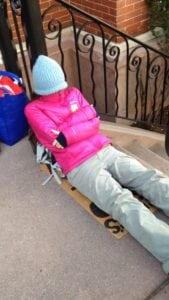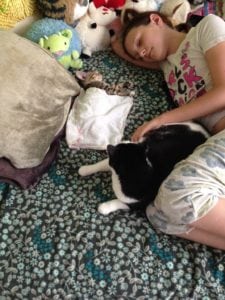Raising Healthy Children, Part 4
Sleep is absolutely critical to good health. While we sleep, we repair damaged tissue (including things we can’t see!), we grow, we replenish hormone supplies and the immune system – we even burn fat (as long as you skip the bedtime snack)! Most of us adults get by on 7 hours of sleep or less a night, but the truth is, human adults need a minimum of 8.5-9 hours each night. Children need even more – 10-12 hours, right up through puberty!
To teach your children the importance of good sleep, start by getting good sleep! It doesn’t do any good to tell your child they need to rest if you’re burning the candle at both ends. Sometimes circumstances don’t give us much choice in the matter, but whenever possible, prioritize sleeping. Talk about the repair and rebuild processes that happen while you’re asleep. Talk about all the growth that happens while you’re sleeping. (You might even mention how the lack of sleep makes us cranky!) Then start to change family habits and priorities to get to bed earlier. Sound hard? Here are some suggestions to make it easier!
- An hour before bedtime, turn the television off. Television, movies, video games, facebook, blogs, excel spreadsheets – anything that happens on a monitor – changes the way the brain functions. Although you don’t consciously see it, the flickering light of the screen dramatically affects the way that your brain works, speeding things up. Getting away from the screen – whatever screen it is – for an hour before going to bed will allow the brain to “calm down” and make it much easier to fall alseep. By the way, this is a good trick for kids who are ADD/ADHD any time of day!
- Dim the lights throughout the house. We need melatonin to fall asleep, and our bodies will make it naturally under one condition: darkness! As it gets darker, the pineal gland (in the brain) is stimulated to make melatonin, which in turn makes you sleepy. So turn off the lights! An hour before you go to bed, switch to candles, a low wattage lamp, or even string christmas lights around the living room. Your kids will be enchanted, and it’ll help the whole family get ready for sleep! While you’re at it, make sure your bedrooms are good and dark too.
- Create bedtime rituals. While you’re all hanging out in a darkened house, have a cup of tea! Chamomile is relaxing and calming, and children usually like it. Linden is another good choice, and my daughter’s favorite. Snuggle up together and read some stories – if your children are older, then institute family reading time! Everyone can lounge around the living room together with a cup of tea and their own favorite book. You could also tell stories out loud, or listen to recorded stories. Listening to stories stimulates a different part of the brain than watching TV/movies, or even reading, and can help improve auditory recall as well!
- Still having trouble? Let your kids solve the problem. Ask them what they need to get to sleep. Maybe they’d like to hand-make a pillow stuffed with lavender and hops flowers – which smell great and really help you relax and rest. Maybe they will need some extra snuggles – well, grownups don’t like to sleep alone either. And if you accidentally fall asleep with them, you probably needed it! You can negotiate both ways: “In order to snuggle with you at bedtime, I need to help to get the laundry done before we read our stories.”
Read the rest of the series:
For a complete guide to navigating adolescence and herbs for teens, check out our Supporting Kids Through Puberty course! It includes webinar-style and standard video sessions chock full of strategies to make the years of puberty more peaceful for everyone in the family. By the end of this program, you’ll know dozens of ways to incorporate herbs into your teen’s food, drinks, and self-care routines to keep them (and you!) healthy and resilient as they transition into adulthood.
This article was originally written for mommypotamus.

Join our newsletter for more herby goodness!
Get our newsletter delivered right to your inbox. You'll be first to hear about free mini-courses, podcast episodes, and other goodies about holistic herbalism.


